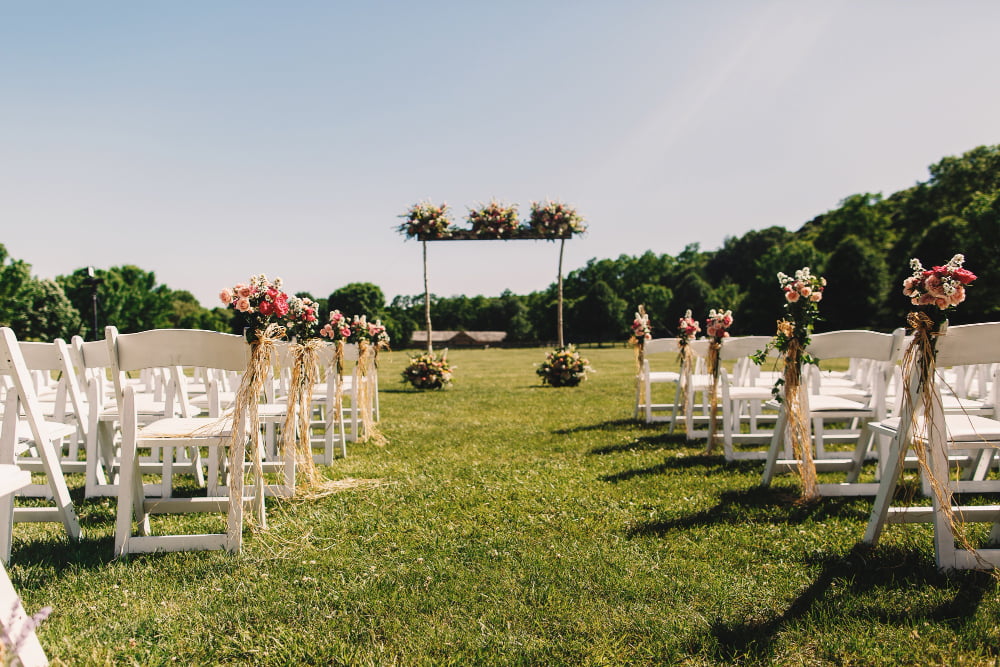Tips for Planning an Outdoor Wedding
For couples seeking a unique and enchanting wedding experience, an outdoor celebration provides the perfect canvas to paint their love story against the backdrop of nature’s beauty. Whether it’s a sun-kissed beach affair, a rustic barn gathering, or a lush garden ceremony, outdoor weddings offer a magical ambiance that indoor venues often struggle to replicate. However, with the open-air charm comes a set of challenges that require thoughtful planning. This guide looks at some essential tips to ensure your outdoor wedding is seamless and memorable.
Choose the Right Season and Location
The first step in planning an outdoor wedding is selecting the right season and location. Each season brings its charm and challenges. Spring and summer are popular choices for their warm weather and blooming landscapes, while fall offers a palette of rich colors. Although less common, winter weddings can be breathtaking with a snowy backdrop. Consider the climate and the comfort of your guests when choosing a season. Additionally, select a venue that aligns with your vision, be it a beach, garden, vineyard, or mountain setting. You might even want to have a theme for your celebration, like holding a glamping wedding.
Have a Contingency Plan
While envisioning a sunny, clear day for your outdoor celebration is ideal, Mother Nature can be unpredictable. Always have a contingency plan in case of inclement weather. Many outdoor venues offer indoor alternatives or have tents available for unexpected rain. Renting a tent can also be a wise investment, providing shelter without compromising the outdoor atmosphere. Stay flexible and prepared for any weather scenario to ensure a stress-free celebration.
Consider Guest Comfort
Ensuring your guests are comfortable throughout the celebration is crucial. Provide shade with tents or umbrellas for hot days, and consider offering blankets or heaters for cooler evenings. High-quality, comfortable seating is essential, especially for longer ceremonies. Be mindful of the terrain at the venue, ensuring that it is accessible for all guests, including those with mobility challenges.
Decorate Mindfully
One of the advantages of outdoor weddings is the natural beauty surrounding you. Use this to your advantage and complement the surroundings with thoughtful decor rather than overwhelming it. Consider seasonal flowers, lanterns, or simple yet elegant arches that enhance the scenery without overshadowing it. Embrace the charm of your chosen location rather than trying to transform it entirely.
Lighting Is Key
The right lighting can transform an outdoor space, creating a magical atmosphere as the sun sets. String lights, lanterns, candles, and fairy lights can add a romantic touch to your celebration. Illuminate pathways and important areas to ensure safety for your guests, and use soft, warm lighting to create an intimate ambiance for the evening festivities.
Sound System Considerations
The great outdoors can present challenges when it comes to sound. Invest in a quality sound system to ensure that your vows, speeches, and music are audible to all guests. Discuss the acoustics of the venue with your audio provider and consider factors like wind and other ambient noise that may affect the clarity of the sound.
Dress Accordingly
Your choice of attire should align with the outdoor setting. Consider the weather and terrain when selecting your wedding dress and the attire for the bridal party. Lighter fabrics are ideal for warm weather, while wraps or shawls can be added for cooler temperatures. Choose footwear that suits the venue, whether it’s elegant sandals for a beach wedding or comfortable flats for a garden ceremony.
Have a Plan for Pests
Bugs and other outdoor pests are an inevitable part of the open-air experience. Take proactive measures to keep them at bay, such as providing insect repellent for guests, incorporating citronella candles into your decor, and scheduling pest control treatments for the venue in the days leading up to the event.
Check Local Regulations and Permits
Before finalizing your outdoor wedding plans, be sure to check local regulations and obtain any necessary permits. Some areas may have restrictions on noise levels, the use of open flames, or the number of guests allowed. Understanding and adhering to these regulations will ensure a smooth and stress-free celebration.
Plan for Adequate Facilities
Unlike indoor venues that often come equipped with comprehensive facilities, outdoor locations may require additional planning for essential amenities. Ensure there are ample restroom facilities for your guests, especially if you’re hosting a larger gathering. Portable restrooms can be an option, and it’s essential to coordinate with the venue to determine the best placement.
Planning an outdoor wedding can be a great journey, embracing the beauty of nature to create a celebration that reflects the unique love between you and your partner. With careful planning and attention to detail, your special day outdoors will be perfect.




